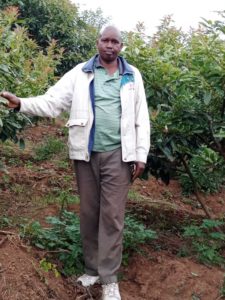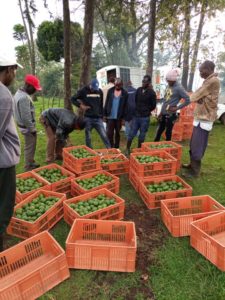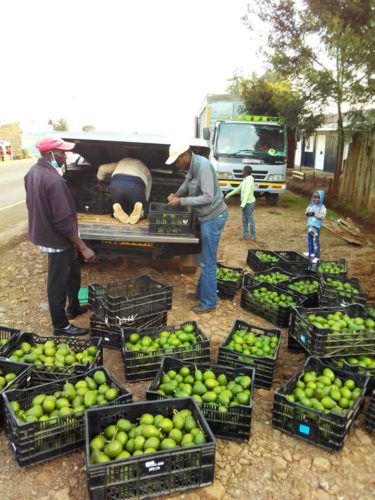How a producers’ organization helped farmers successfully export avocado to Europe
“Before the Forest and Farm Facility Programme (FFF) reached out to us, I faced many challenges in marketing the avocado produce from my farm,” says Paul Mitei, a farmer from Kiptoben Village, Nakuru County, Kenya. Paul says he wanted to know more about how the avocado and tomato value chains worked, and the proper inputs that are critical to avocado cultivation and meeting market demands.
Paul is married with 3 children and has a 5-acre farm where his family tends to avocado trees. He says he started to grow avocadoes because other farmers in his community were growing them, but at that time he had poor crop management skills which led to low fruit yields, no profit and a lot of frustration. .
To improve his knowledge and capacity on the avocado value chain, he joined the Nakuru Small Holder Fruit Producers Association (NASFPA) with the hopes of higher sales of his farm produce. “Being a member of NASFPA, I am now well informed about better market access and can benefit from the FFF project. The initiative also gave me the opportunity to export my produce to Europe,” Paul said. He now produces high value fruits and sells together with his fellow NASFPA members. Paul currently has 104 avocado fruit trees out of which 15 were fully mature by last year. Out of the 15 matured trees he harvested 500 kgs last year and sold at 120 Kenyan shillings per kilogram, earning KES 60,000 (USD 600).


Farmers’ organizations support farmers’ livelihoods
The Nakuru Small Holder Fruit Producers Association (NASFPA) was formed in July 2016 with support from the Forest and Farm Facility, a partnership involving the Food and Agriculture Organization (FAO) of the United Nations and other partners. NASFPA’s membership cuts across Nakuru County with 250 members and focuses on avocado and tomato farmers. The membership consists of business-oriented individual farmers and groups carrying out fruit farming. NASFPA is a member of the apex producer organization in Kenya called Farm Forestry Smallholder Producers Association of Kenya (FFSPAK). It is supported by the Forest and Farm Facility (FFF).
Through FFSPAK, the group offers several services to members including advocating for a better business environment, training farmers, looking for markets for products, and information collection and sharing.
Before FFF, farmers produced a wide range of products on their farms but with limited economic benefits. These crops included maize, beans, peas, cabbages, and potatoes, among others. Farmers also kept domestic animals like cows, sheep, and chickens for food and as an investment. Many farmers operated individually with little knowledge about farming, poor access to extension services and inputs, and lack of financing. This made production low in terms of both quantity and quality and led to low income.
At the start of the FFF initiative, NSAFPA distributed high-quality seedlings to farmers on a policy of 50 percent co-financing. Farmers would, for example, buy 10 avocado seedlings and be given another 10 seedlings as a bonus. This initiative was embraced so well that in a short time, all members had increased the number of fruit trees on their farms tremendously. The matured trees have then increased the volumes and quality of fruits, which has also allowed access to export markets.
Impact of exporting avocado to Europe
Farmers initially practiced subsistence farming and mixed a lot of crops, domestic animals, and trees. However, after they were organized into larger market-focused groups, they were taken through market analysis and development where they prioritized avocados as the main enterprise. After this, they attended different trainings on organizational development, fruit tree production, business planning, risk management, and advocacy.
Armed with this knowledge, the farmers have transformed their organization and livelihoods for the better. Now, they can focus on prioritized products ensuring that quantities and quality produced are adequate and aggregating them for the best-paying markets, which has improved their livelihoods.
To achieve this, the farmers organized themselves into a stronger farmers’ organization that provides necessary services to members and implemented a well-defined business plan. Currently, they can sell their avocados to exporters at 120 KES per kg up from around 30 shillings they used to sell locally. Starting in 2020, their association was able to link members with an exporter of avocados ensuring that they earn better incomes.
In total, NASFPA members harvested 25,000 kgs of avocado for export, earning KES 2,250 (about USD 22,500). With promising markets, an enabling business environment led by the government, and support from FFSPAK and FFF, NASFPA is in the process of transforming to a Nakuru Small Holder Fruit Cooperative Society to enable scaling-up of production and greater marketing of their produce.
More exports, better livelihoods
The experience demonstrated the transformation that can occur when people come together with the will and drive to take charge of their lives. Only a few years back, family farmers in this area earned very little income and largely depended on subsistence, but thanks to their collective effort, an economic and social transformation is taking place, improving people’s lives.
The Forest and Farm Facility is a global programme lead by FAO and supports Kenyan farmers’ organizations such as the NASFPA through FFSPAK, improving the livelihoods of family farmers through and integrated set of initiatives to improve rural farming, forestry, and farmers’ organizations through collective action.
Learn more.
Website: Yenkasa Africa
Website: Forest and Farm Facility
Website: FAO Country Profile: Kenya
Website: FFSPAK
Facebook: FFSPAK facebook


Comments are closed, but trackbacks and pingbacks are open.